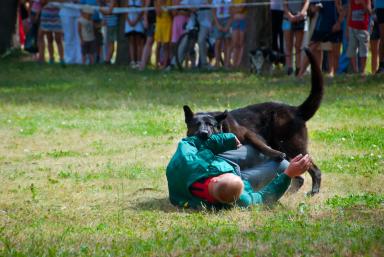California Dog Bite Laws

In the Golden State, where sunshine and open spaces beckon humans and their four-legged companions, dog bites are an unfortunate reality that demands attention. California witnesses thousands of dog bite incidents yearly – with over 2,000 insurance claims in 2017 alone. These incidents inflict physical and emotional trauma and pose substantial legal questions for both victims and dog owners.
Our guide aims to clarify uncertainty, covering California’s statute of limitations, the strict liability doctrine, dog owner responsibilities, civil and criminal penalties, and how to report a dog bite incident. We’ll also provide essential guidance on finding an expert attorney to assist you with your case.
California’s dog bite laws are complex, but you can confidently navigate this with the proper knowledge and resources.
Statute of Limitations in California for Dog Bite Claims
The statute of limitations for dog bite lawsuits in California is generally two years.
While this may seem like little time, California upholds this specific statute of limitations in light of the preservation of evidence. Over time, evidence related to the dog bite incident, such as medical records, photographs, witness statements, and physical evidence, can degrade or become less reliable. Filing a lawsuit within the statute of limitations ensures you can present substantial evidence to support your case.
Liability Standards and Negligence in California Dog Bite Cases
Under California Civil Code Section 3342, often called “the dog bite statute,” a dog owner is strictly liable for injuries caused by their dog biting someone in a public place or lawfully on private property, including the dog owner's property. The owner is legally responsible for the harm caused by their dog’s bite, even if they had no prior knowledge of the dog’s aggressive tendencies or had never bitten anyone before.
No Requirement for Prior Knowledge: Unlike some states where the owner must know their dog’s dangerous propensities, California’s strict liability law does not require any previous incidents or warnings. Whether the dog has a history of aggression, the owner is still liable for injuries resulting from a bite.
Public Place or Lawfully on Private Property: The strict liability standard applies when the dog bite victim was either in a public place or lawfully on the owner’s private property. If someone was trespassing at the time of the dog bite, the strict liability standard may not apply.
Exceptions: There are certain exceptions to California’s strict liability rule. For example, if a person provokes the dog into biting them, the dog owner may not be held strictly liable for the injuries. Additionally, if someone is injured by a dog from something other than a bite – such as being knocked down by a dog – different legal principles may apply.
Dog Owner Responsibilities in California
In California, dog owners have several essential responsibilities regarding their dogs’ behavior. These responsibilities are outlined under various state laws and local ordinances, and they include:
Control and Restraint: Dog owners must ensure that their dogs are under control and restrained at all times when in public places or on their property. This typically means keeping the dog on a leash when outside, especially in areas with leash laws, and ensuring that the dog cannot roam freely.
Preventing Attacks: Owners are responsible for preventing their dogs from attacking or biting other people or animals. This includes taking precautions to minimize the risk of aggressive behavior, such as proper training and socialization.
Warning Signs: If a dog has a history of aggressive behavior or is known to be dangerous, the owner should display warning signs, such as “Beware of Dog” signs, on their property.
Vaccination Requirements: Dog owners must comply with vaccination requirements, which may vary by locality. Ensuring that the dog is current on vaccinations can help prevent the spread of diseases and reduce the risk of aggressive behavior due to illness.
Potential Defenses for Dog Owners in California
Even with California’s strict liability standard, certain defenses are available for dog owners. These include the following:
Provocation: If the victim of a dog bite provoked the dog, the owner may argue that the provocation was a contributing factor and seek to reduce their liability.
Trespassing: If the victim was trespassing or unlawfully on the owner’s property at the time of the incident, the owner might use this as a defense against strict liability, as the dog bite statute generally applies when the victim is lawfully on the property.
Assumption of Risk: In some cases, if the victim voluntarily assumed the risk associated with interacting with the dog, such as knowing the dog’s aggressive tendencies and still approaching it, the owner may argue that the victim assumed the risk of injury.
These defenses may vary in applicability and effectiveness depending on the specific circumstances of each case. Legal advice from an experienced attorney is crucial for dog owners and victims of dog bites to navigate the legal landscape surrounding dog bite incidents in California.
Breed-Specific Legislation in California
California does not impose breed-specific legislation at the state level, meaning there are no statewide bans or restrictions targeting specific dog breeds. However, local municipalities within California have the authority to enact their own breed-specific regulations. These local ordinances can vary and may include requirements such as mandatory spaying or neutering of certain breeds at a specific age, breed-specific licensing, or restrictions on breeds perceived as aggressive, such as Pit Bulls and Rottweilers.
Controversies in Breed-Specific Legislation
Many animal welfare organizations and advocates oppose breed-specific legislation for several reasons. They argue that this legislation is ineffective in reducing dog bite incidents because it focuses on breeds rather than individual dog behavior and responsible ownership. Research has shown that factors like socialization, training, and the owner’s behavior significantly impact a dog’s behavior more than its breed.
In addition, breed-specific legislation often leads to discrimination against specific breeds, resulting in the unfair stigmatization and euthanasia of well-behaved dogs solely based on their appearance. This approach punishes responsible dog owners and their pets for the actions of a few irresponsible owners.
Civil Penalties for Dog Bites in California
Most dog bite cases can be resolved in civil court. During the legal proceedings, both parties present evidence and arguments. The court determines liability based on whether the dog owner violated California’s strict liability dog bite statute or was negligent in controlling their dog.
Penalty Assessment: If the court finds the dog owner liable, it will assess the penalties and damages for the victim. These penalties are typically determined based on the victim’s medical expenses, pain and suffering, lost wages, and other economic and non-economic damages.
Enforcement: Once the court orders the dog owner to pay the determined penalties, enforcement mechanisms come into play. This may include garnishing the dog owner’s wages or placing liens on their property to ensure the victim receives the awarded compensation.
Insurance Coverage: In many cases, the dog owner’s homeowner’s insurance policy may cover the penalties and damages resulting from a dog bite. The insurance company may negotiate a settlement with the victim or pay out the court-ordered fines on behalf of the dog owner.
It’s essential to note that the specific process and penalties can vary depending on the circumstances of each case, local court procedures, and the strength of the evidence presented. Additionally, some dog owners may settle the case outside court through negotiations or mediation.
Criminal Penalties for Dog Bites in California
Criminal penalties are determined and enforced through a legal process that involves law enforcement, prosecutors, and the criminal justice system. While the penalties can vary depending on the nature of the offense and the severity of the injury, the process is relatively standard from case to case.
Investigation: Law enforcement is usually called to investigate when a severe dog bite incident may warrant criminal charges. The severity of injuries and circumstances surrounding the incident play a significant role in whether criminal charges will be pursued.
Prosecutor’s Review: After the investigation, a prosecutor will review the case and determine whether to file criminal charges against the dog owner. The decision is based on the severity of the injuries, evidence of negligence or recklessness, and potential for a successful prosecution.
Criminal Charges: If the prosecutor decides to proceed, they may file charges against the dog owner. These charges can vary, including offenses such as “owning a mischievous or vicious animal” or more severe charges like criminal negligence.
Penalty Determination: The case goes to court, where the dog owner faces a criminal trial. The court determines the criminal penalties if the dog owner is found guilty. These can include fines, probation, community service, and, in severe cases, incarceration.
Reporting and Handling Dog Bite Incidents
Properly tending to and reporting a dog bite is crucial for the safety of the victim and potential legal actions. If you or someone you know is bitten by a dog:
Seek Immediate Medical Attention: Your first priority should always be your health. Clean the wound with soap and water, apply an antiseptic, and seek medical treatment promptly. Even seemingly minor bites can lead to infections.
Identify the Dog Owner: Obtain the dog owner’s contact information, if possible. This will be important for reporting the incident and any potential legal actions.
Report to Local Authorities: Contact your local animal control agency, police department, or sheriff’s office to report the dog bite incident. They can document the incident, gather information, and ensure the dog is appropriately evaluated for health risks.
Document the Incident: If you can do so safely, take photos of your injuries and the scene where the dog bite occurred. This documentation may be valuable for legal purposes.
Seek Legal Assistance: Consult a personal injury attorney experienced in dog bite cases. They can help you understand your rights, guide you through the legal process, and assist in pursuing compensation if applicable.
Remember, reporting the dog bite incident is essential for your safety and the safety of others. It can also ensure that responsible actions are taken regarding the dog, potentially leading to compensation for your injuries.
How To Find a Dog Bite Attorney in California
Recovering compensation after a dog bite incident can be a complex legal process, and having the proper legal assistance is crucial to ensure your rights are protected and you receive the compensation you deserve.
If you require a skilled attorney to handle your dog bite case, consult Expertise.com’s directory of experienced personal injury attorneys. Each featured attorney undergoes a rigorous review process, ensuring that only the best lawyers are included. These attorneys have been carefully evaluated for their expertise, client satisfaction, and positive reputation in the field.
Expertise.com StaffAuthor
Step into the world of Expertise.com, your go-to hub for credible insights. We don't take accuracy lightly around here. Our squad of expert reviewers, each a maestro in their field, has given the green light to every single article you'll find. From rigorous fact-checking to meticulous evaluations of service providers, we've got it all covered. So feel free to dive in and explore. The information you'll uncover has been stamped with the seal of approval by our top-notch experts.




